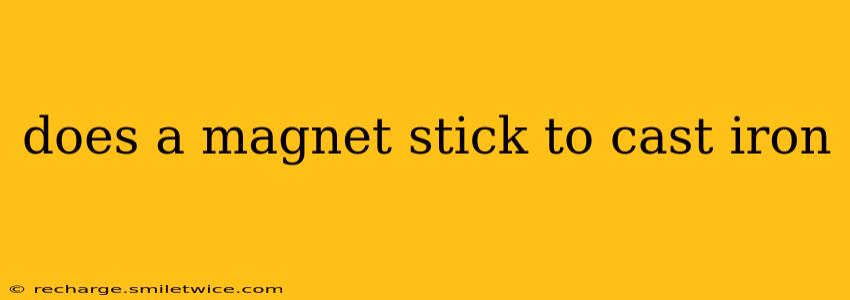Does a Magnet Stick to Cast Iron? A Comprehensive Guide
Yes, a magnet will generally stick to cast iron. This is because cast iron is a ferrous material, meaning it contains iron and is therefore magnetic. However, the strength of the attraction can vary depending on several factors. This guide will explore these nuances and answer common questions surrounding the magnetism of cast iron.
What Makes Cast Iron Magnetic?
Cast iron's magnetic properties stem from its high iron content. Iron atoms possess a property called "magnetic moment," meaning they act like tiny magnets. In most materials, these moments are randomly oriented, cancelling each other out. However, in ferromagnetic materials like iron, these moments align under the influence of an external magnetic field, resulting in a net magnetic effect. Cast iron, being primarily iron, exhibits this ferromagnetic behavior, allowing magnets to adhere to it.
Why Doesn't a Magnet Always Stick to Cast Iron?
While cast iron is generally magnetic, several factors can influence the strength of the magnetic attraction or even prevent a magnet from sticking altogether:
- The type of cast iron: Different grades of cast iron have varying iron content and compositions. Some alloys might contain other elements that reduce the overall magnetic susceptibility. For example, the presence of significant amounts of non-ferrous metals could weaken the magnetic attraction.
- The surface condition of the cast iron: Rust, paint, or other coatings on the surface of the cast iron can create a barrier, preventing the magnet from making direct contact with the iron and reducing the magnetic force. A clean, bare surface will always provide the strongest magnetic interaction.
- The strength of the magnet: A weak magnet might not have enough force to overcome the inherent resistance or surface imperfections. A stronger magnet will usually exhibit a stronger attraction.
- The thickness of the cast iron: In exceptionally thin cast iron pieces, the magnetic field might not be strong enough to create a noticeable attraction.
How Strong is the Magnetic Attraction to Cast Iron?
The strength of the magnetic attraction depends on all the factors mentioned above. Generally, the attraction is quite strong when using a reasonably powerful magnet and a clean, thick piece of cast iron. However, it's not as strong as the attraction to a pure iron sample of the same size.
What about other types of iron? Does a magnet stick to wrought iron or steel?
Yes, magnets will also generally stick to wrought iron and steel. These are also ferrous materials, although the strength of the attraction can vary depending on the alloying elements and heat treatment.
Can I use a magnet to test if something is cast iron?
Using a magnet is a quick and easy way to suggest a material is cast iron, but it's not definitive proof. A positive result (the magnet sticks) strongly indicates the presence of iron, but further testing would be necessary for a conclusive identification. The magnet test can help differentiate cast iron from other non-ferrous materials like aluminum or plastic.
Are there any exceptions to this rule?
While rare, some specialized cast iron alloys might have reduced magnetic properties due to their composition. However, the vast majority of cast iron will exhibit a noticeable attraction to magnets.
By understanding these factors, you can better predict how a magnet will interact with cast iron in various situations. Remember that a magnet test is a useful but not foolproof method for identifying cast iron.
